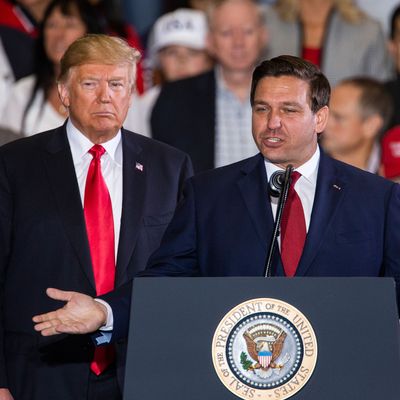
Florida governor Ron DeSantis, who is badly trailing Donald Trump in the invisible primary phase of the 2024 Republican presidential race, has been racing to the right to prove himself as a MAGA 2.0 candidate and perhaps even more reliably extremist than Trump. His latest move is to try to out-macho Trump on his plans for the southern border:
DeSantis is in favor of fully mobilizing the U.S. military for border duty, killing migrants smuggling drugs, and even sending Coast Guard and Navy ships to block Mexican ports where chemicals used to make fentanyl are allegedly received. You can judge for yourself whether he’s made himself more ferociously nativist than Trump with these gestures. But on one important and complex legal topic, all he can do is say “Me too!” He’s echoing Trump’s repeated calls for ending “birthright citizenship.”
The legal doctrine in question is contained in Section 5 of the 14th Amendment: “All persons born or naturalized in the United States, and subject to the jurisdiction thereof, are citizens of the United States and of the State wherein they reside.” It seems clear enough, particularly given the context, which was to establish that the “free soil” of a reunited America made full citizens of ex-slaves. The prevailing Supreme Court interpretation of the birthright-citizenship clause, handed down in 1898, held that the American-born son of noncitizen immigrants was indeed a citizen.
But the phrase “subject to the jurisdiction of,” originally intended to exclude the children of foreign diplomats and Native Americans from automatic citizenship, has caused some doubt and confusion. A smattering of conservative legal scholars have argued that it means Congress can regulate birthright citizenship, typically by withholding it from the children of immigrants present in the country illegally. Trump asserted before and after becoming president that he had the power to do exactly that by executive order. He never did, however, probably because he was told it would invite an immediate court challenge. But in his current campaign, he has pledged to issue an order ending birthright citizenship (technically requiring that one parent of a qualifying person be a citizen or legal resident) on “day one” of his next administration.
DeSantis hasn’t made it clear exactly how he would accomplish an end to birthright citizenship; perhaps he is preserving a future opportunity to demagogue the issue more specifically. Both he and Trump assert without evidence that the chance to secure citizenship for future offspring is a major driver of illegal immigration. It has become very common in neo-nativist circles to use such terms as “chain migration” and “anchor babies” to demonize birthright citizenship.
In the monkey-see, monkey-do climate of the 2024 GOP presidential contest, it will be interesting to see if other candidates join this particular bandwagon. Mike Pence defended without necessarily embracing Trump’s early attacks on birthright citizenship. Tim Scott said he was “open” to legal arguments that it was unwarranted. Nikki Haley and Vivek Ramaswamy are in an interesting situation as children born in the U.S. to noncitizens, albeit noncitizens legally in the country.
No matter what these politicians say, the odds remain high that the federal courts will stick with the traditional “free soil” interpretations of the 14th Amendment. As as Cristian Farias wrote when Trump’s first attack on birthright citizenship was threatened: “If the small cadre of anti-birthright truthers want a different reading, only a constitutional amendment will do.”
More on politics
- Trump Ambassador Picks: Who’s in His ‘Diplomatic Clown Car’
- What We Learned From the House Ethics Report on Matt Gaetz
- Everyone Biden Has Granted Presidential Pardons and Commutations






























